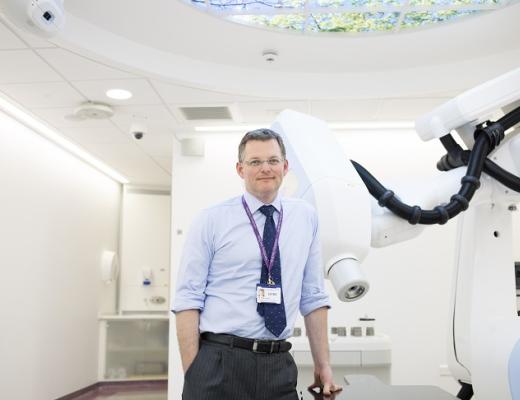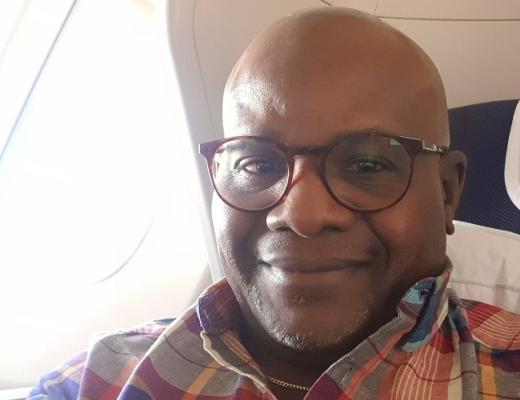Joining a trial by chance revealed I had early stage prostate cancer
Here, Dennis shares his journey at The Royal Marsden, speaking to the importance of early detection in helping people avoid invasive cancer treatment.
“If it wasn’t for the BARCODE1 trial, I would be going about my life as normal – with no idea about actually having prostate cancer.”

“I was born and raised in New York and sadly have a history of cancer in my family. So, from the age of 25, my GP back in the US tested and logged my PSA levels.” (A PSA test is a blood test that measures the amount of a protein called prostate-specific antigen. High levels of PSA can indicate prostate cancer).
“I continued having the PSA tests done when I moved to the UK in 2001, and they all came back as normal. I had no issues or symptoms that would make me think that something could be wrong. Without BARCODE1, I would have had no idea.”
A breakdown: What is the BARCODE1 trial?
The BARCODE1 trial investigated how genetics could be used to target screening for prostate cancer. It invited healthy men over a certain age in the UK to participate by providing saliva samples.
The aim of the study is to diagnose prostate cancer earlier than a PSA test. When a patient’s cancer is diagnosed at an early stage, there is a much greater chance of being able to treat the disease successfully.
The Royal Marsden Cancer Charity supports this research through the work of the Early Diagnosis and Detection Centre, which uses the latest screening technologies combined with Artificial Intelligence (AI) to identify people at higher risk of cancer and diagnose them earlier. The research also received funding from The Institute of Cancer Research, London.
Dennis initially received a letter about the BARCODE1 trial in the post and he expressed an interest in the study, he was then contacted again with more information and asked to provide a saliva sample.
Receiving an early diagnosis of prostate cancer
“The results of my sample indicated I was in the top 10% of the genetic risk scoring system – so I was high risk and more susceptible to getting prostate cancer. I wasn’t shocked by this given my family history. So, I had blood and urine samples taken, as well as an MRI scan.”

“Soon after the MRI, I was contacted by The Royal Marsden team letting me know the results highlighted an ‘area of concern’. I needed to go to the hospital in Chelsea for further investigations.”
“This is when I received my prostate cancer diagnosis. While scary to learn this, I was reassured by the BARCODE1 study team that it had been caught very early. I was also advised of the options I had, with active surveillance being my choice at this early stage.”
Annual visits, a biopsy and… jazz music?
“Since 2021, I’ve been back at The Royal Marsden in Sutton once a year for a PSA test and an MRI scan so that the team can monitor my prostate cancer. For the past few years everything was stable, with no growth of the cancer.”
“However, the last MRI scan disturbed me a little bit as it picked something up. I had to go back two weeks later for a biopsy and more tests. I knew what to expect this time with the biopsy, but it’s still not a pleasant experience.”
Thank you to the Urology team for making this experience as comfortable as possible.
“While I was having the biopsy I joked that it would be nice to have some jazz music on to make things more comfortable. The next thing I knew, the lights were down, and some Nina Simone was playing in the background! This helped everyone to relax and get on with what had to be done. Thank you to the Urology team for making this experience as comfortable as possible.”
“Luckily, what was picked up in this last scan is the same area of concern that showed up in the last few scans. This means I can continue my programme of active surveillance for now.”

Early cancer diagnosis saves lives
“Early detection at this level means that I can continue to monitor my cancer, making sure that it doesn’t grow or spread, and I may not need any active treatment like surgery. Plus, knowing that technology is constantly advancing could mean if I do need treatment down the line, it might not be as invasive or life changing.”
"People are sometimes scared of going for tests and checks, but the sooner you find out about your diagnosis the better – early diagnosis is key."

“I’ve been preaching to all my friends in the US and in the UK: talking and being aware of your health could save your life.”
“For me, life now is great, and I feel like I have so much more to give. My wife and I live in a little village in Devon and I’m semi-retired, spending half my time volunteering in our local community. When we moved from the US, living here was only meant to be a three-year experiment. But I’m still experimenting, and my wife and I are still here - we’re very happy!”
Thanks to The Royal Marsden
“The Royal Marsden is fantastic. The BARCODE1 study team and Urology department’s support and care are so reassuring. The hospital is leading on so much with regards to major research and new techniques, everything is cutting edge.”
“To anyone funding early diagnosis research at The Royal Marsden Cancer Charity, I thank them immensely – I’m on their team!”
Help us continue our work in early diagnosis
We know that 1 in 2 people will have a cancer diagnosis in their lifetime. To have the best chance, they need to be diagnosed as early as possible so that they can be treated before their cancer has spread.
We are only able to fund facilities like the Early Diagnosis and Detection Centre with the help of our generous supporters.
Help us continue funding vital work like this by making a donation today.
Enjoyed this story?
Read more in our blog



